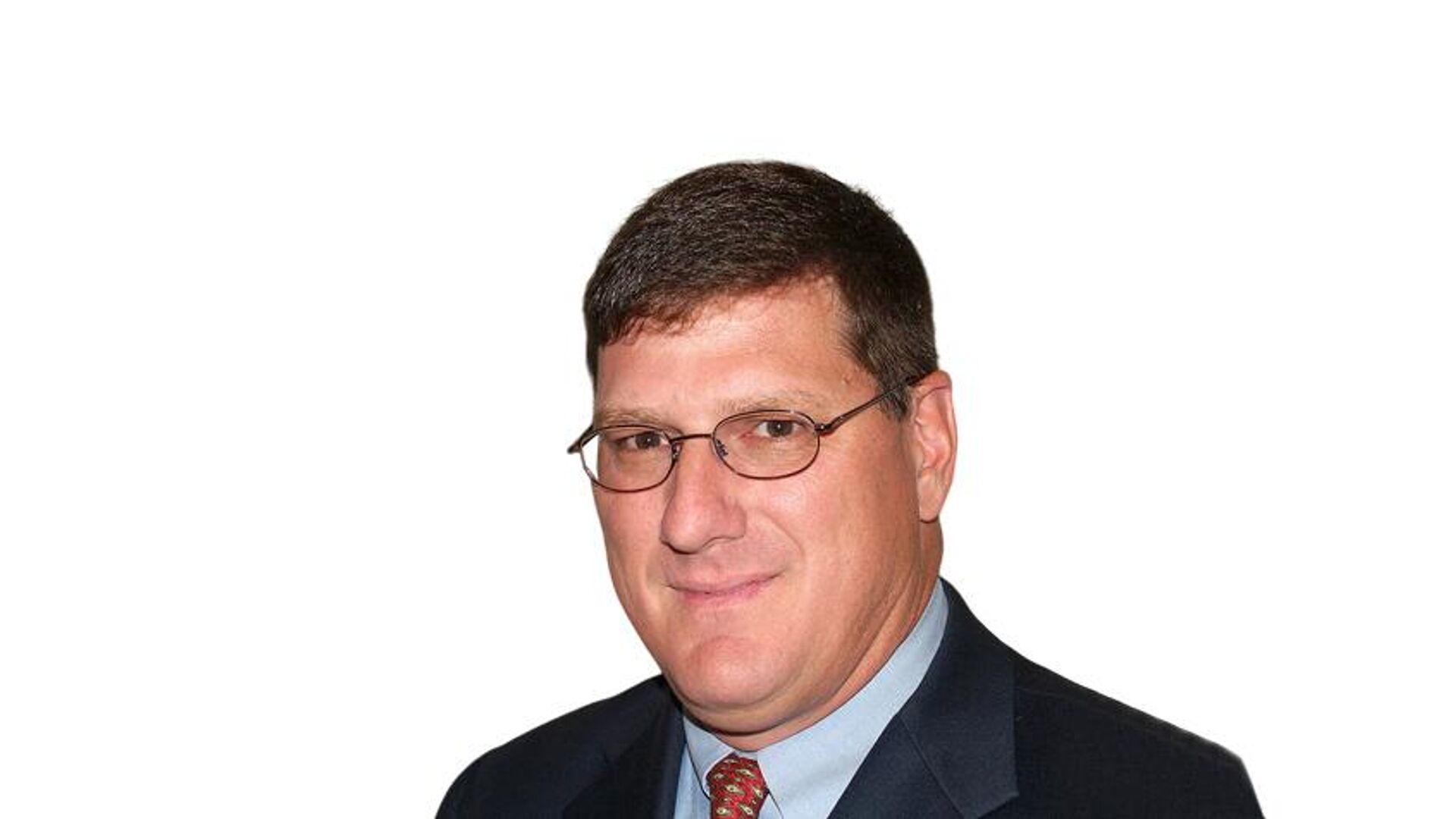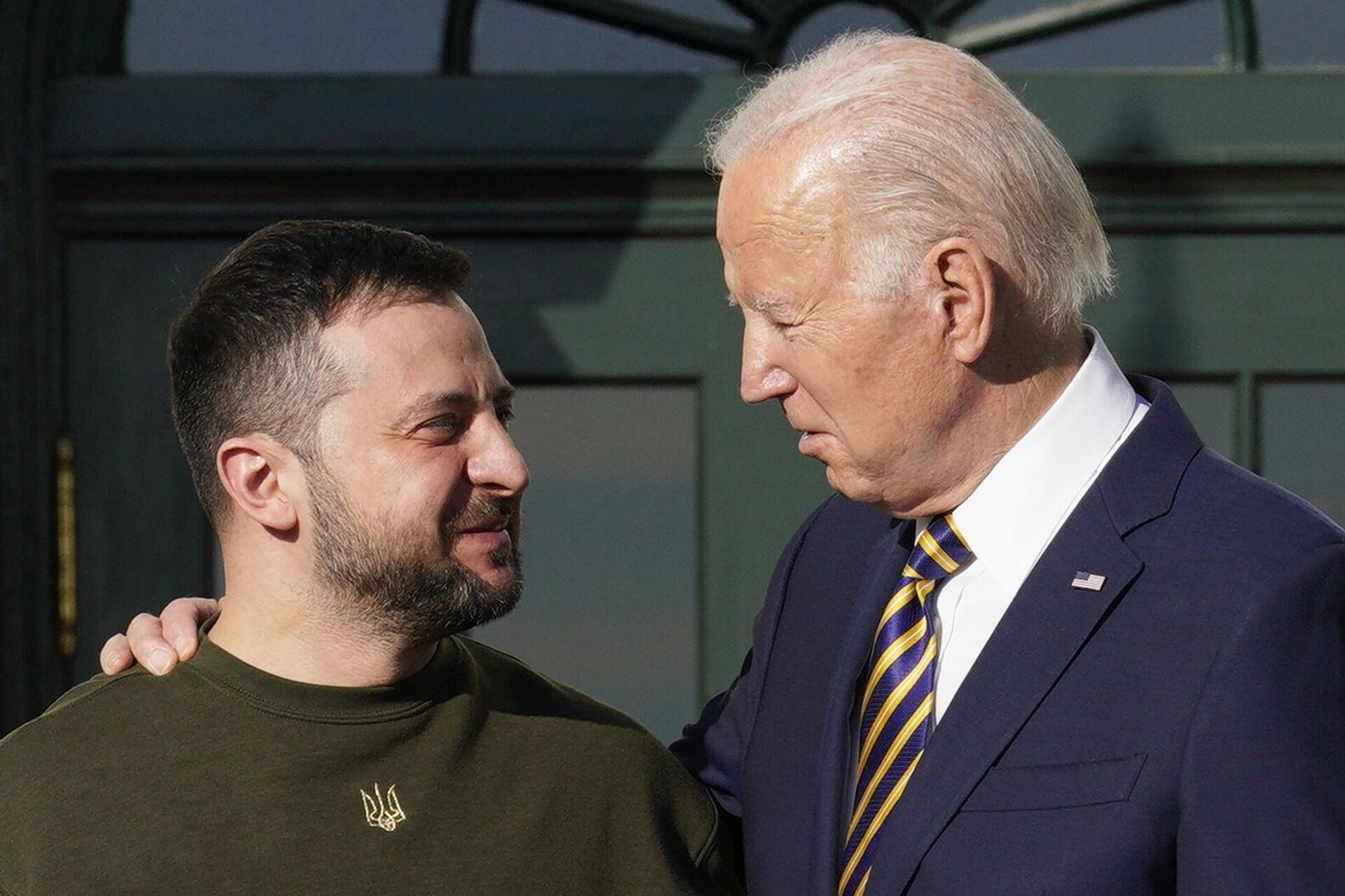https://ukraina.ru/20230324/1044683903.html
Скотт Риттер о том, что было и что будет: Зеленский— неудачник, читает речи, написанные разведчиками США
Скотт Риттер о том, что было и что будет: Зеленский— неудачник, читает речи, написанные разведчиками США - 27.11.2023 Украина.ру
Скотт Риттер о том, что было и что будет: Зеленский— неудачник, читает речи, написанные разведчиками США
Six months have passed since the explosions of two branches of the Nord Stream pipeline. The terrorist attack took place on the night of September 26, 2022. The Украина.ру, 27.11.2023
2023-03-24T06:45
2023-03-24T06:45
2023-11-27T11:17
украина
экономика
сша
россия
джо байден
северный поток
владимир зеленский
газопровод
военная помощь
диверсия
/html/head/meta[@name='og:title']/@content
/html/head/meta[@name='og:description']/@content
https://cdnn1.ukraina.ru/img/07e7/03/0f/1044405182_39:12:864:476_1920x0_80_0_0_f0880680fafa946aaad20b3d1659e5fe.jpg
Six months have passed since the explosions of two branches of the Nord Stream pipeline. The terrorist attack took place on the night of September 26, 2022. The Russian and Western press are actively discussing the possible culprits of the tragedy at the pipelines, with one of the latest versions pointing to the Ukrainian trail. American columnist, former Marine reconnaissance officer and UN weapons inspector William Scott Ritter, Jr. in an exclusive interview with Ukraina.ru revealed what the United States thinks about the explosions of the Nord Stream gas pipelines and Joe Biden's policy on Ukraine.— The United States said that explosions on the North Stream underwater has pipelines could be carried out by a certain pro Ukrainian group. This was reported on 7 of March by the New York Times sitting U.S. intelligence data. What do you think about it? Нow do americans react to this?— Well, I think most Americans are skeptical about the US government's position on the Nord Stream pipeline is that Joe Biden, the president, said in February of 2022 that he, as president, was he was going do it, that he could shut it down. One has to assume that the President did it. And so this spinning is just I think, most people accepted his lies by the US government.Unfortunately, the lies won't resonate because most Americans believe that this pipeline needed to be shut down in order to prevent Russia from leveraging its energy advantages over Europe. So in this case, most americans probably are not upset that the president is lying through his teeth and they find the New York Times stories to just be an interesting sidebar, you know that doesn't impact their day-to-day lives. To most Americans, it doesn't matter if Seymour Hersh is right or if the New York Times is right. They don't care.— How do ordinary taxpayers in the United States feel about Biden's Ukrainian policy vector?— Most taxpayers don't know enough about Ukraine or the war to really have an informed position as long as their personal economic space remains unchanged or, you know, is trending in a positive direction. Very few Americans will be critical of foreign aid, especially when it's been backed up by the Information Warfare program designed to paint Russia in the worst possible light and make Ukraine seem like the best democratic nation in the world after America. So as long as Americans believe the messaging they're being given by their government, as long as they are comfortable at home, they're not going to confront you on these decisions. If Americans are jolted out of their comfort zone because of economic difficulties and if the information spectrum fails to continue to back up the notion that Russia is bad, then people might start to question maybe Ukraine is not as good as everybody thought they were, and people will start to question whether or not this kind of a diversion of American resources is worth the effort.— What do the Americans know about Zelensky? How is the mainstream media treats him?— We know very little about a lot people. We know very little about a lot of things, and it is due to a lack of trying, I mean, not a lack of information. If you want to know about Zelensky, you can learn about Zelensky. For instance, his entire career as a comedian is available. You can watch him on the Internet. You can watch his show, Servant of The People on TV. I've watched that show. I've laughed very loud. He's a very funny actor. His show is very clever. And I learned that he's a professional actor, a professional. Comedian.I also know that he ran for President. I could study the campaign. There were plenty of articles written during the campaign that talked about the inadequacies of this man as a political figure and how that was attractive to many ukrainians because they were tired of politicians, the normal politicians, the corruption of the politicians. I also know I could read that Zelensky talked about being anti-war, that he was going to work for peace, and that many Ukrainians believed this message. So I know that.I also know that when he became president, he was not up to the task. He was confronted by the political realities of Ukraine and was unable to overcome them. That his staff collapsed. He had to hire new people. His popularity plummeted. He became less democratic. He became more autocratic. He shut down freedom of the press. He shut down political opposition. And this all happened before the war. So if I read everything available, I would know that Zelensky was a failed President, who was failing at his job before the war began. And so then I would be able to compare and contrast that with the messaging put out by the mainstream media that suddenly Zelenski is the modern day Winston Churchill and he is the Thomas Jefferson of Ukraine, that he is the epitome of democracy. He's the best of leaders, the strongest of leaders, the most informed of leaders. You see, if I read all that stuff beforehand, I know this was a lie, but if I didn't read all that stuff? And the first time I'm hearing Zelenski's name is when the press is telling me that this is Winston Churchill, when they're showing me him speaking to the US Congress, to the British Parliament, reading speeches that are written by U.S. intelligence officers. But I don't know it's written by U.S. intelligence officers. And unless I read the newspapers and found out that the US intelligence community admitted making up words for Zelensky, you remember, “I don't need a ride. I need ammunition.” That's a quote that was out there. He never said it and the US intelligence community admits they made those words up. Now, most people won't have dug into that, so they're believing what they're hearing. When Nancy Pelosi says that Zelensky's speech to the US Congress was the greatest speech in the history of the US Congress, how many people have gone and read all the speeches in the history of the US Congress to realize that that's an absurd statement? Or do they accept it at face value because they're ignorant of everything? Americans don't know who Zelensky is. They've been sold an image by the media. And that's what they are believing, or at least that's what they're leading or convincing themselves to believe. The problem for Zelensky is it doesn't take too much work to dig past the lies and get to the truth of who he actually is. And many Americans now, especially when there's $115 billion of money flowing to Ukraine and we're reading about how there's no accounting that much of this money has been put into the pockets of corrupt politicians like Zelensky and others. People started to ask questions and the image that's emerging of Zelensky is not a favorable.— Two banks were closed in the USA. How will this event affect the economic situation in the USA and in the world?— Well, it's hard to tell. Does this constitute a regional phenomenon, or will it resonate nationally, and if it resonates nationally, will it resonate internationally, I think. What it shows is these banks fail either because of the potential lack of regularities in the way that a particular bank was managed, or was this mirrored across America. If it was, then we could see more banks of fail right now. I think it's too early to determine whether this is more than just bad management practices on the part of a couple banks or is this reflective of the entire industry.— Will this event lead to reduction aid from USA to Ukraine?— That's a political question, but because all politics links back to economics issues, then one can imagine that if we get in a situation here in the United States where the US government is being asked to bail out banks to, you know, hundreds of billions of dollars of unbudgeted money. That there might be a political, you know, backlash from people who will say if we need to spend that money here at home, then we shouldn't be giving it away to Ukraine. And I think we're going to be seeing, as this war reaches its conclusion, more and more people recognizing that Ukraine cannot win the war and therefore continued investment in Ukraine is futile. And they'll be looking for excuses not to divert American money to Ukraine. And I think one of those excuses could be the cost of the bailing out failed banks.
украина
сша
россия
Украина.ру
editors@ukraina.ru
+7 495 645 66 01
ФГУП МИА «Россия сегодня»
2023
Украина.ру
editors@ukraina.ru
+7 495 645 66 01
ФГУП МИА «Россия сегодня»
Новости
ru-RU
https://xn--c1acbl2abdlkab1og.xn--p1ai/
Украина.ру
editors@ukraina.ru
+7 495 645 66 01
ФГУП МИА «Россия сегодня»
Украина.ру
editors@ukraina.ru
+7 495 645 66 01
ФГУП МИА «Россия сегодня»
Украина.ру
editors@ukraina.ru
+7 495 645 66 01
ФГУП МИА «Россия сегодня»
украина, экономика, сша, россия, джо байден, северный поток, владимир зеленский, газопровод, военная помощь, диверсия, политолог, американцы
Six months have passed since the explosions of two branches of the Nord Stream pipeline. The terrorist attack took place on the night of September 26, 2022. The Russian and Western press are actively discussing the possible culprits of the tragedy at the pipelines, with one of the latest versions pointing to the Ukrainian trail.
American columnist, former Marine reconnaissance officer and UN weapons inspector William Scott Ritter, Jr. in an exclusive interview with Ukraina.ru revealed what the United States thinks about the explosions of the Nord Stream gas pipelines and Joe Biden's policy on Ukraine.
— The United States said that explosions on the North Stream underwater has pipelines could be carried out by a certain pro Ukrainian group. This was reported on 7 of March by the New York Times sitting U.S. intelligence data. What do you think about it? Нow do americans react to this?
— Well, I think most Americans are skeptical about the US government's position on the Nord Stream pipeline is that Joe Biden, the president, said in February of 2022 that he, as president, was he was going do it, that he could shut it down. One has to assume that the President did it. And so this spinning is just I think, most people accepted his lies by the US government.
Unfortunately, the lies won't resonate because most Americans believe that this pipeline needed to be shut down in order to prevent Russia from leveraging its energy advantages over Europe. So in this case, most americans probably are not upset that the president is lying through his teeth and they find the New York Times stories to just be an interesting sidebar, you know that doesn't impact their day-to-day lives. To most Americans, it doesn't matter if Seymour Hersh is right or if the New York Times is right. They don't care.
— How do ordinary taxpayers in the United States feel about Biden's Ukrainian policy vector?
— Most taxpayers don't know enough about Ukraine or the war to really have an informed position as long as their personal economic space remains unchanged or, you know, is trending in a positive direction. Very few Americans will be critical of foreign aid, especially when it's been backed up by the Information Warfare program designed to paint Russia in the worst possible light and make Ukraine seem like the best democratic nation in the world after America. So as long as Americans believe the messaging they're being given by their government, as long as they are comfortable at home, they're not going to confront you on these decisions.
If Americans are jolted out of their comfort zone because of economic difficulties and if the information spectrum fails to continue to back up the notion that Russia is bad, then people might start to question maybe Ukraine is not as good as everybody thought they were, and people will start to question whether or not this kind of a diversion of American resources is worth the effort.
— What do the Americans know about Zelensky? How is the mainstream media treats him?
— We know very little about a lot people. We know very little about a lot of things, and it is due to a lack of trying, I mean, not a lack of information. If you want to know about Zelensky, you can learn about Zelensky. For instance, his entire career as a comedian is available. You can watch him on the Internet. You can watch his show, Servant of The People on TV. I've watched that show. I've laughed very loud. He's a very funny actor. His show is very clever. And I learned that he's a professional actor, a professional. Comedian.
I also know that he ran for President. I could study the campaign. There were plenty of articles written during the campaign that talked about the inadequacies of this man as a political figure and how that was attractive to many ukrainians because they were tired of politicians, the normal politicians, the corruption of the politicians. I also know I could read that Zelensky talked about being anti-war, that he was going to work for peace, and that many Ukrainians believed this message. So I know that.
I also know that when he became president, he was not up to the task. He was confronted by the political realities of Ukraine and was unable to overcome them. That his staff collapsed. He had to hire new people. His popularity plummeted. He became less democratic. He became more autocratic. He shut down freedom of the press. He shut down political opposition. And this all happened before the war.
So if I read everything available, I would know that Zelensky was a failed President, who was failing at his job before the war began. And so then I would be able to compare and contrast that with the messaging put out by the mainstream media that suddenly Zelenski is the modern day Winston Churchill and he is the Thomas Jefferson of Ukraine, that he is the epitome of democracy. He's the best of leaders, the strongest of leaders, the most informed of leaders.
You see, if I read all that stuff beforehand, I know this was a lie, but if I didn't read all that stuff? And the first time I'm hearing Zelenski's name is when the press is telling me that this is Winston Churchill, when they're showing me him speaking to the US Congress, to the British Parliament, reading speeches that are written by U.S. intelligence officers.
But I don't know it's written by U.S. intelligence officers. And unless I read the newspapers and found out that the US intelligence community admitted making up words for Zelensky, you remember, “I don't need a ride. I need ammunition.” That's a quote that was out there. He never said it and the US intelligence community admits they made those words up. Now, most people won't have dug into that, so they're believing what they're hearing.
When Nancy Pelosi says that Zelensky's speech to the US Congress was the greatest speech in the history of the US Congress, how many people have gone and read all the speeches in the history of the US Congress to realize that that's an absurd statement? Or do they accept it at face value because they're ignorant of everything?
Americans don't know who Zelensky is. They've been sold an image by the media. And that's what they are believing, or at least that's what they're leading or convincing themselves to believe. The problem for Zelensky is it doesn't take too much work to dig past the lies and get to the truth of who he actually is. And many Americans now, especially when there's $115 billion of money flowing to Ukraine and we're reading about how there's no accounting that much of this money has been put into the pockets of corrupt politicians like Zelensky and others. People started to ask questions and the image that's emerging of Zelensky is not a favorable.
— Two banks were closed in the USA. How will this event affect the economic situation in the USA and in the world?
— Well, it's hard to tell. Does this constitute a regional phenomenon, or will it resonate nationally, and if it resonates nationally, will it resonate internationally, I think. What it shows is these banks fail either because of the potential lack of regularities in the way that a particular bank was managed, or was this mirrored across America. If it was, then we could see more banks of fail right now. I think it's too early to determine whether this is more than just bad management practices on the part of a couple banks or is this reflective of the entire industry.
— Will this event lead to reduction aid from USA to Ukraine?
— That's a political question, but because all politics links back to economics issues, then one can imagine that if we get in a situation here in the United States where the US government is being asked to bail out banks to, you know, hundreds of billions of dollars of unbudgeted money. That there might be a political, you know, backlash from people who will say if we need to spend that money here at home, then we shouldn't be giving it away to Ukraine.
And I think we're going to be seeing, as this war reaches its conclusion, more and more people recognizing that Ukraine cannot win the war and therefore continued investment in Ukraine is futile. And they'll be looking for excuses not to divert American money to Ukraine. And I think one of those excuses could be the cost of the bailing out failed banks.








